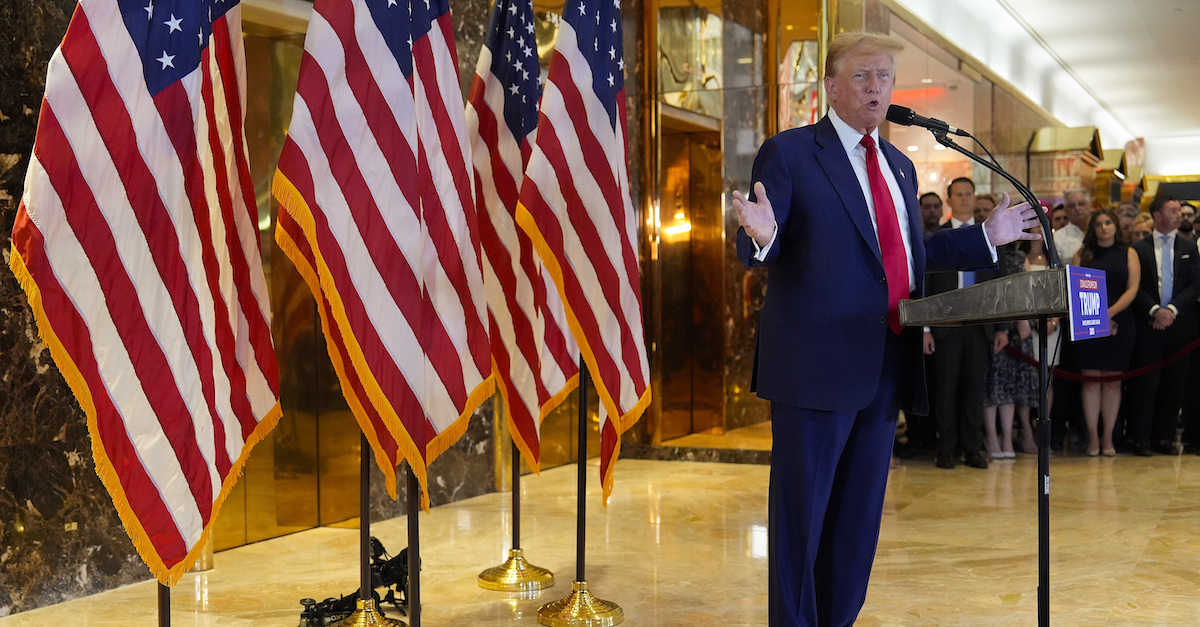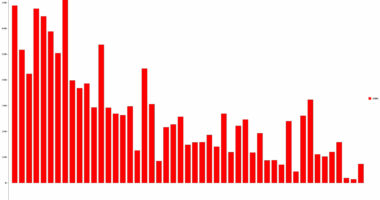
Donald Trump speaks during a news conference at Trump Tower, Friday, May 31, 2024, in New York (AP Photo/Julia Nikhinson).
The Trump administration over the weekend denied accusations that it was violating a federal court order barring the government from implementing a policy that would freeze funding on distributions to federal aid programs.
In a 17-page filing on Sunday, the administration asserted that any continuing freezes in disbursements did not “run afoul” of the directives contained in a Jan. 31, temporary restraining order from U.S. District Judge John McConnell, which found the spending freeze both unconstitutional and in violation of a federal law blocking government action deemed “arbitrary and capricious.”
“Defendants respectfully submit that the actions described below do not run afoul of the Court’s injunction, or at least not a ‘clear and unambiguous command’ in the Court’s injunction,” the administration wrote in the filing. “Rather, they represent good-faith, diligent efforts to comply with the injunction across the broad spectrum of Federal financial assistance implicated by the Court’s Order. Thus, Defendants’ actions are consistent with the Court’s Order, and Plaintiffs’ motion should be denied.”
The memo at the heart of the litigation — issued on Jan. 27, by the Office of Management and Budget (OMB) — purported to make good on a series of executive orders issued by President Donald Trump outlining the administration’s spending priorities. It stated, in part (bold in original):
[T]o the extent permissible under applicable law, Federal agencies must temporarily pause all activities related to obligation or disbursement of all Federal financial assistance, and other relevant agency activities that may be implicated by the executive orders, including, but not limited to, financial assistance for foreign aid, nongovernmental organizations, DEI, woke gender ideology, and the green new deal.
The directive caused mass confusion throughout entities dependent on the federal government for funding as entire payment portals and websites went dark overnight. In response to the widespread panic and disorientation, the administration quickly rescinded the OMB memo with a terse second memo that also directed employees to follow up with agency lawyers if they had any questions.
A coalition of states, led by New York Attorney General Letitia James, on Friday accused the administration of violating the order, telling the court that since the TRO went into effect, there had been “an ever-changing kaleidoscope of federal financial assistance that has been suspended, deleted, in transit, under review, and more.”
“Plaintiff States and entities within the Plaintiff States continue to be denied access to federal funds,” the States wrote in the Friday filing. “These denials continue to cause immediate irreparable harm.”
The administration pushed back on the plaintiffs’ claims, asserting that a large portion of current pauses or delays in funding disbursements are due to a different OMB memo that was issued nearly a week prior to the memo at issue in the case, which ordered the “immediate pause” of disbursing certain “funds appropriated under the Inflation Reduction Act of 2022 or the Infrastructure Investment and Jobs Act.”
The filing states that a “separate action issued six days earlier cannot be described as ‘giving effect to’ or constituting ‘continued implementation’ of OMB Memo,” the government wrote. “Given that Plaintiffs here do not challenge [the prior OMB memo], Defendants have reasonably interpreted the temporary restraining order not to extend to that Memorandum, and the Court should not enjoin something that is not properly challenged in the Complaint.”
Trump’s filing also appeared to suggest that the current state of confusion was a problem of the administration’s own making.
The document states that after the OMB memo at the heart of the case was issued, there was an “unusually large number of entities that attempted to draw down funds in PMS [the Payment Management System], with many recipients requesting larger-than-normal amounts, sometimes up to their full grant.” Some 7,000 requests were subsequently flagged by the system as “unusual payment requests” which required further review, resulting in a “backlog,” per the filing.
“This type of operational delay — caused by processes related to the underlying operation of the program — does not constitute a ‘freeze’ or ‘pause’ of funding that would violate the Court’s Order,” the filing states. “Rather, it is simply a feature of PMS working through an unusually large volume of payment requests.”
The administration further requested that the court clarify the intended scope of its order and “allow Defendants to comply with the clarified understanding.








